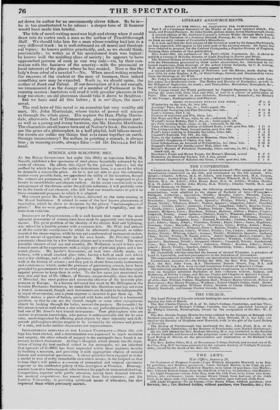SCIENCE AND SCIENTIFIC MEN.
AT the ROYAL. INSTITUTION last night (the 30th) an ingenious Italian, M. Novelli, exhibited a few specimens of steel plates beautifully coloured by the oxide of chrome. He effects this object by the galvanic battery ; but the method by which he gives the oxide a determinate galvanic
is a secret for which he demands a reasonable price. As he is not yet able to give the colouring matter every possible form, we apprehend the utility of the invention, though the colours are permanent, will not be great. It may be employed to give beauty to sword-blades and elegant cutlery. As the secret consists only in the manag-ement of the chrome under the galvanic influence, it will probably soon he in the hands of our chemists, who will lead our manufacturers to put it to those ornamental purposes to which it is adapted.
We cannot praise Mr. Burners lecture, delivered on the same evening at the Royal Institution. It related to some of the best known phenomena of vegetation, which he chose to designate by the phrase " metamorphoses of plants." But we were guests—we respect the rights of hospitality, and ab- stain from criticism.
INGENUITY OF PH1LO501'HERS.—It is well known that some of the most splendid discoveries of science have.been made by apparently very inadequate means. The great problem of the identity of the electric fluid and lightning, was solved by a humble printer with a common kite. Mr. Watt hat arrived at all the scientific conclusions by which he afterwards improved, or rather invented the steam-engine, while he was yet a mathematical instrument-maker, and by means of apparatus made by his own hands. Dr. Priestley created pneumatic chemistry by a few broken glasses and a wooden bowl. The most scientific chemist of our age and country, Dr. Wollaston, is said to have per.- formed roost of his experiments with a single pair of galvanic plates and a few watch glasses. Mr. Leslie's discoveries, on heat were chiefly made, we believe, with a small crooked glass tube, having a bulb at each end, which cost a few shillings, and is called a photomer. Many similar events are met with in the history of science ; and they put to shame those costly instruments and contrivances which, under the pretence of patronizing science, have been provided by governments for no other purpose, apparently, than that they might appoint persons to keep them in order. 'To the few cases just mentioned we may also add that of Dr. Others, of Bremen, unquestionably, since the death of Herschel. the most patient and successful observer of the heavenly phe- nomena in Europe. In a lecture delivered last week by Mr. Millington at the London Mechanics Institution, he stated unit this illustrious man has not even a transit instrument, though such instruments are thought to he indispensable in royal observatories, and a great expense is incurred to put them up. Dr. Gibers makes a piece of batten, pierced with holes and fixed in a horizontal position, so that he can see the church steeple or some other conspicuous ohieet by looking through the holes, answer the purpose He is enabled by this means to tell as well when a star returns to any particular position, as if he had one of Mr. Jones's best transit instruments. True philosophers who are zealous to promote knowledge, who pursue it enthusiastically and for its own sake, arethstinguished by effecting great objects by their ingenuity and skill: pseudo philosophers always require to be assisted by the revenue and power of a state, and make neither discoveries nor improvements.
IMPROVEMENTS EFFECTED BY THE LONDON UNIVERSITY.—SinCe this Col- lege has been started, and a determination was expressed to teach medicine and surgery, the other schools of surgery in the metropolis have found it ne- cessary to exert themselves. At Guy's I lospital, which already has the repu- tation of being the best medical school in the metropolis, we are informed that upwards of 25,0004 has been expended within these eighteen mouths in building a museum, and providing it with appropriate objects of natural history and anatomical specimens. A clever artist has been engaged to make a model in wax of every remarkable case which occurs, in the hospital so that in time Guy's will possess a museum of anatomical and surgical specimens superior to the celebrated gallery of this description at Florence. Drawing- masters have also been engaged, who instruct the pupils in anatomical drawing. Competition, together with public attention, having been directed towards the medical corporations, has roused them from their slumbers: and the London University, in providing additional anus of education, has also improved those which previously existed.


















 Previous page
Previous page